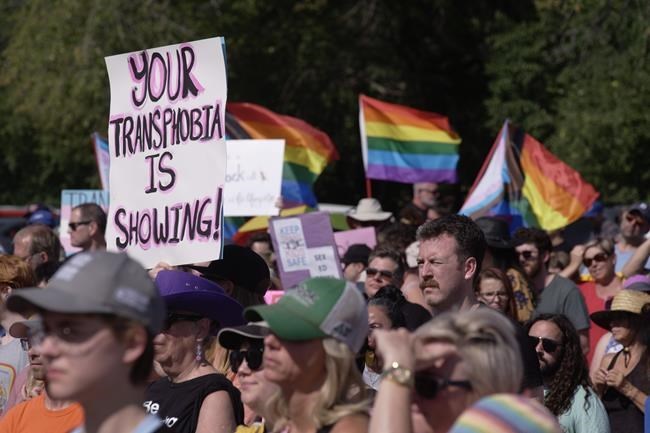
People protest at the Legislative Building in Regina, Saturday, Sept. 2, 2023. Saskatchewan's child advocate has released a report saying the province's pronoun policy in schools violates rights and is discriminatory.THE CANADIAN PRESS/Michael Bell
Republished September 15, 2023 - 6:04 PM
Original Publication Date September 15, 2023 - 4:51 PM
REGINA - Saskatchewan's child advocate has released a report saying the province's pronoun policy in schools violates rights to gender identity and expression.
“The policy clearly discriminates against transgender children who are unable or unwilling to seek parental consent for the use of their preferred name and pronouns,” said Lisa Broda in a 41-page report released Friday.
She said the policy is also contrary to law or discriminatory. All people, regardless of age, have an inherent human right to have their general identity and gender expression respected.
“The Ministry of Education and all schools in the province are bound by these legal obligations,” the report said.
The provincial government announced last month that it is requiring parental consent when children under 16 want to use different names or pronouns at school.
Dustin Duncan, then education minister, said the province wanted to standardize pronoun and naming policies across school divisions. He also said some parents and teachers had complained.
A court challenge has been launched against the policy and the government has said it plans to enshrine it in legislation this fall.
Premier Scott Moe said this week he is prepared to use the notwithstanding clause to protect the policy.
The province has said schools are to provide supports to children who won’t be accepted at home for their gender identity, though it has not detailed how that would work.
Provincial reliance on a broad commitment to "parental rights" on its own does not override the rights of the child, Broda said.
“The very same children who are denied their self-identify at home are therefore also denied their identity at school,” the report said. “In this way, the most vulnerable transgender students are further marginalized by the policy.”
Human rights groups have said they are concerned the change could result in outing transgender kids to parents who don't accept them.
The Saskatchewan government did not address the children's advocate's concerns in a brief response to the report.
"The Ministry of Education acknowledges the Advocate’s comments in the report and agrees with her that there are various positive impacts derived from the policy, such as recognizing the importance of parents and guardians in supporting a child’s development," it said in a statement.
"The Government of Saskatchewan remains committed to protecting the right of parents to be involved in their children's education and to implementation of the Parental Inclusion and Consent policy."
Saskatchewan NDP Opposition education critic Matt Love said in a statement that the Saskatchewan Party government needs to scrap the policy.
"The children’s advocate has spoken: the Sask. Party’s outing policy violates the rights of children," he said.
A similar move earlier this year in New Brunswick was faced by intense opposition by LGBTQ groups.
In New Brunswick, child and youth advocate Kelly Lamrock found the policy violated the province's Human Rights Act, the Education Act and children's Charter rights.
Broda said, to her knowledge, the Saskatchewan Party government did not consult school boards, teacher organizations, school staff, experts or the Saskatchewan Human Rights Commission.
“Considering that recognition of gender identity is a human rights issue with significant impact on young people, it is notable that children and youth – and specifically transgender and gender diverse children and youth – were not consulted, despite being the rights holders directly impacted,” Broda said.
She said evidence has shown that young people are placed at higher risk of self-harm if they are prevented from expressing their authentic selves. The policy also leaves school staff in a difficult position of possibly knowing they are violating the rights of a student by continually misgendering them if they have not received parental consent.
“Children are human beings with their own rights and legally recognized ability to make certain personal decisions in accordance with their maturity and capacity,” the report said.
— By Kelly Geraldine Malone in Saskatoon
This report by The Canadian Press was first published Sept. 15, 2023.
News from © The Canadian Press, 2023